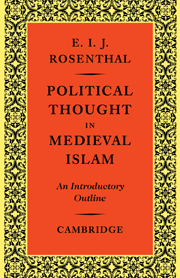APPENDIX: SOME TURKISH VIEWS ON POLITICS
Published online by Cambridge University Press: 07 May 2010
Summary
Since this book deals with political thought in medieval Islam, the Western student might expect that Al-Dawwānī's treatise discussed in chapter x would be the last to be considered. Even if we take the view that cultures and civilizations decline and, to all outward appearance, even die as a distinct and coherent spiritual force, we know that they survive and remain active and creative in varying degrees. Because this survival is a very real influence, there can be no doubt that Islam as a way of life, as a religious civilization, cannot be confined within the rigidly drawn frontiers of time implied in the terms “medieval” or “modern” history (wherever the division between the two is considered to fall). The basic tenets and attitudes of Islam have never ceased to be “medieval”; those who call themselves Muslims today can lay claim to this title only as long as they profess and try to realize these fundamental beliefs and convictions.
In this sense, the year 1500 in Islam was like any other year; it was no watershed, no demarcation line. The spiritual conflict in modern Islam is not, therefore, between believers and atheists, but between rigid upholders of the Sharīʿ a as formulated in the Middle Ages—and since that time static and unalterable—and those others who are bent on reform and modernization. To discuss modernism is outside the scope of this book, since much more is at stake than a revival of the caliphate and a modification of the classical theory of the khilāfa.
- Type
- Chapter
- Information
- Political Thought in Medieval IslamAn Introductory Outline, pp. 224 - 233Publisher: Cambridge University PressPrint publication year: 1958

